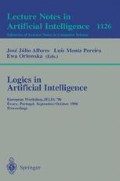Abstract
The aim of this paper is to describe the algorithmic foundations of the part of the program Exten responsible for the computation of extensions in Constrained Default Logic. Exten is a system that computes extensions for various default logics.
The efficiency of the system is increased by pruning techniques for the search tree. We motivate and present these techniques, and demonstrate that they can cut down the size of the search tree significantly. Quite importantly, they complement well the recently developed stratification method. This technique has to be modified to work properly with Constrained Default Logic, and we show how this can be done.
Exten supports experimentation with default logic, allowing the user to set various parameters. Also it has been designed to be open to future enhancements, which are supported by its object-oriented design. Exten is part of our long-term effort to develop an integrated toolkit for intelligent information management based on nonmonotonic reasoning and belief revision methods.
Preview
Unable to display preview. Download preview PDF.
References
G. Antoniou. Nonmonotonic Reasoning with Incomplete and Changing Information. MIT Press 1996 (forthcoming)
R. Ben-Eliyahu and I. Niemela (eds.). Applications and Implementations of Nonmonotonic Reasoning Systems. Proceedings of the IJCAI-95 Workshop.
G. Brewka. Cumulative default logic: in defense of nonmonotonic inference rules. Artificial Intelligence 50, 2 (1991): 183–205
P. Cholewinski. Stratified Default Logic. In Proc. Computer Science Logic 1994, Springer LNCS 933, 456–470
P. Cholewinski, W. Marek, A. Mikitiuk and M. Truszczynski. Experimenting with default logic. In Proc. ICLP-95, MIT Press 1995
A. P. Courtney. Towards a Default Logic Workbench: Computing Extensions. Honours Thesis, Basser Department of Computer Science, University of Sydney 1995
J.P. Delgrande, T. Schaub and W.K. Jackson. Alternative Approaches to default logic. Artificial Intelligence 70 (1994): 167–237
M. Hopkins. Orderings and Extensions. In Proc. ESQUARU'93, Springer 1993, LNAI 747
E. Koutsofinos and S.C. North. Dot. Bell Laboratories, http://www.research.att.com/orgs/ssr/book/reuse
T. Linke and T. Schaub. Lemma Handling in Default Logic Theorem Proving. In Proc. Symbolic and Quantitative Approaches to Reasoning and Uncertainty, Springer 1995, LNAI 946, 285–292
W. Lukaszewicz. Considerations of default logic: an alternative approach. Computational Intelligence 4, 1(1988): 1–16
A. Mikitiuk and M. Truszczynski. Constrained and rational default logics. In Proc. International Joint Conference on Artificial Intelligence 1995
D. Poole. A Logical Framework for Default Reasoning. Artificial Intelligence 36 (1988): 27–47
R. Reiter. A logic for default reasoning. Artificial Intelligence 13(1980): 81–132
V. Risch and C. Schwind. Tableau-Based Characterization and Theorem Proving for Default Logic. Journal of Automated Reasoning 13 (1994): 223–242
T. Schaub. On Constrained Default Theories. In Proc. ECAI-92, Wiley 1992, 304–308
T. Schaub. A new methodology for query-answering in default logics via structure-oriented theorem proving. Journal of Automated Reasoning 15, 1 (1995): 95–165
K. Schlechta. Directly Sceptical Inheritance cannot Capture the Intersection of Extensions. In Proc. GMD Workshop on Nonmonotonic Reasoning, GMD 1989
K. Wallace. Proof Truncation Techniques in Model Elimination TableauBased Theorem Proving. Ph.D. Thesis, Department of Computer Science, University of Newcastle 1994
Author information
Authors and Affiliations
Editor information
Rights and permissions
Copyright information
© 1996 Springer-Verlag Berlin Heidelberg
About this paper
Cite this paper
Antoniou, G., Courtney, A.P., Ernst, J., Williams, M.A. (1996). A system for computing constrained default logic extensions. In: Alferes, J.J., Pereira, L.M., Orlowska, E. (eds) Logics in Artificial Intelligence. JELIA 1996. Lecture Notes in Computer Science, vol 1126. Springer, Berlin, Heidelberg. https://doi.org/10.1007/3-540-61630-6_16
Download citation
DOI: https://doi.org/10.1007/3-540-61630-6_16
Published:
Publisher Name: Springer, Berlin, Heidelberg
Print ISBN: 978-3-540-61630-6
Online ISBN: 978-3-540-70643-4
eBook Packages: Springer Book Archive

